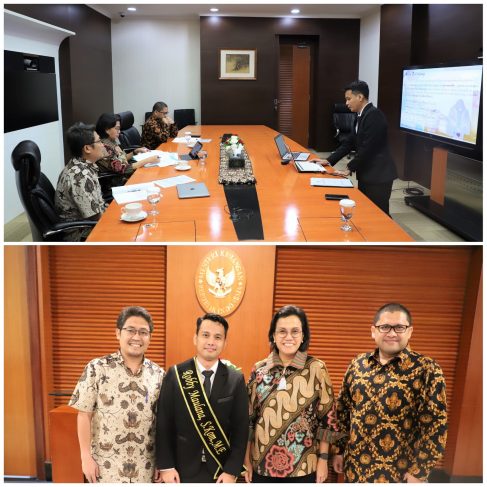Studying Financial Inclusion, Thesis MPKP FEB UI Student Tested by Minister of Finance Sri Mulyani
Nino Eka Putra ~ Humas FEB UI
JAKARTA – Bappenas scholarship students from the Government of West Kalimantan Province with the specialization of Urban and Regional Planning Economics in the Master of Economic Planning and Development Policy Study Program (MPKP) FEB UI, Robby Maulana (1806248324) held the Final Work Session Test (Thesis) located in meeting room of the Minister of Finance, Ministry of Finance Republic of Indonesia Building, on Tuesday (7/1/2020).
The session was chaired by Sri Mulyani Indrawati as the Minister of Finance of the Republic of Indonesia as well as the FEB UI Teaching Staff, with Chaikal Nuryakin as the Chair of the FEB UI Regular Economics Study Program, and member examiner Febrio Nathan Kacaribu as a lecturer at the Economics Department FEB UI.
The Final Work (Thesis) raised, with the theme “Financial Inclusion: The Effect of Account Ownership and Availability of Financial Institution Access to Household Loans”. Low financial inclusion makes it difficult for people to get access to loans both for funding venture capital and other investments such as education or housing.
However, several studies have shown that increasing account ownership and the existence of financial institutions do not necessarily increase household interest in getting credit. With the multinomial logit regression estimation method using 294,426 household samples from Susenas and Podes in 2018, this study aims to determine whether account ownership and the existence of financial institutions have an effect on increasing household credit.

“Estimation results show that account ownership can increase formal credit and also reduce informal credit. This shows that account ownership is important in encouraging formal credit and reducing informal credit. The existence of commercial banks, rural banks and cooperatives can increase formal credit but it is not significant in reducing informal credit,” said Robby.
He added, the results of this study showed a significant relationship between account ownership of both formal and informal loans. Households that have accounts tend to receive loans at formal financial institutions and tend to leave informal credit.
In addition, this confirms that account ownership is closely related to formal credit. So that account ownership becomes important for households to get access to other finances such as formal credit. Therefore, the stages in financial inclusion are needed to increase the probability of someone getting a formal loan.
“Then from the supply side, the existence of commercial banks whether government, private or bank agents is able to increase formal credit, but has a not too large impact on informal credit. Besides banks, the existence of other financial institutions such as rural banks and cooperatives is also able to increase opportunities for households to obtain loans from formal institutions,” he explained.
This is an indication that there is competition between formal financial institutions and informal lenders, and also indicates that the existence of financial institutions that provide formal credit cannot completely replace informal credit. Even so the existence of formal financial institutions is still very much needed to be able to provide formal credit.
“For this reason, the government needs to encourage account ownership and expand the reach of financial institutions in encouraging formal credit and reducing informal credit,” he concluded.
Thus, the Council Leadership decided, Robby Maulana (1806248324) was declared graduated with an A grade and successfully earned a Masters in Economics. Congratulations Robby Maulana, M.E.! (Des)








